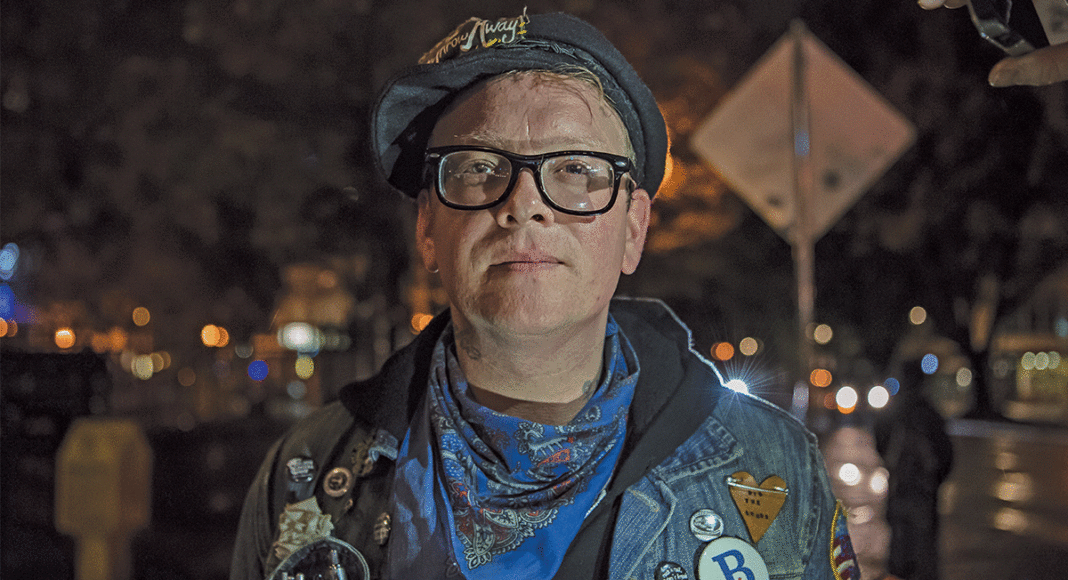“I’m a product of your rural slums,” sings Micah Schnabel on his latest solo album, Your New Norman Rockwell. You get the sense that when he sings this, and other lines like “hoping to bring us together through our similarities, rather than divide us through our differences,” he’s trying to create a bridge that will connect our polarized blue and red nation. He grew up in rural Ohio, after all.
But that wasn’t his goal at all. The singer, who’s known for his alt-country-rock band Two Cow Garage, went into the project with the intention of gaining empathy for all of the rural folks he grew up with, especially after Trump rampaged to the presidency last year. He was surprised by what came out instead.
“I wish I could say I was trying to do this greater good, but I wasn’t. I was grappling with how much anger and resentment I hold toward rural America from growing up in it,” Schnabel tells me. “There are beautiful, wonderful human beings everywhere. But it’s really hard, trying to find those people.”
He currently resides in liberal Columbus, Ohio. (“If you drive out of Columbus for 15 minutes either way, you’re immediately into rural towns. You see the confederate flags and all that shit,” he says.) Having spent his formative years in a town that had a population of maybe 10,000 people, he had a first-hand view of how life isn’t always fair for small-town Americans. But he is also outraged by the attitudes he still sees there.
“The heroin problem in the town I grew up in is absolutely rampant. They’re trying to pass legislation now that they’re not going to use the [prescription opiate antidote] Narcan because people are bitching about their tax dollars being used to save junkies,” Schnabel says. “They’re willing to let their neighbors die.”
The topic of education gets him particularly riled up. He says he left school basically without any actual knowledge, and says it was “commonplace” for his teachers to use racial slurs in class.
This album potently conveys all of this with images of rural Americans from his own history. (“Grown adults…crushing up prescription pills/snorting them through pink tampon applicators.”) As a singer, he comes off somewhere between a Baptist preacher and a slam poetry artist, with his long, breathless, mostly spoken strings of lyrics that are almost divorced from the music behind it.
Schnabel treated the lyrics differently on this record than he had on any previous solo release or Two Cow Garage album. His songwriting process had always been to write the music first and then compose lyrics after. This time he flipped the process. It may not seem like a big deal, but it allowed him to engage on what he was saying in a completely new way.
“I always felt like I was short-changing the story, by just trying to find rhymes. I rarely ever felt good about, like it wasn’t a completed story. I really wanted the lyrics to stand on their own,” Schnabel says.
He actually did this once prior to writing the songs on Your New Norman Rockwell. It was with the Two Cow Garage song “Let the Boys Be Girls,” a powerful statement of support for LGBTQ rights. That song was an eye-opener, and led him to want to write more songs this way.
He finished up Your New Norman Rockwell in early January. By then, talk about understanding the forgotten rural Americans had only increased in liberal circles. I ask him if writing the record gave him the empathy he was searching for. “No,” he says, much to my surprise.
He even wrote a novel recently, which just got shipped off to his publisher, and dives even deeper into these characters. This was also part of his process to find empathy—if anything would get him there, writing a book would.
“That was my big search. Digging through these characters that I grew up with and thinking of them. I still haven’t found it, even after that,” Schnabel says. “That really bums me out. I was really hoping the exercise of it would give me a little bit of relief. I guess it did release a little bit of the steam. It’s just, the fucking internet exists. All those excuses are kind of out the window at that point for a white privileged person.”
INFO: Sept. 6, 9 p.m., Crepe Place, 1134 Soquel Ave., Santa Cruz. $8. 429-6994.













